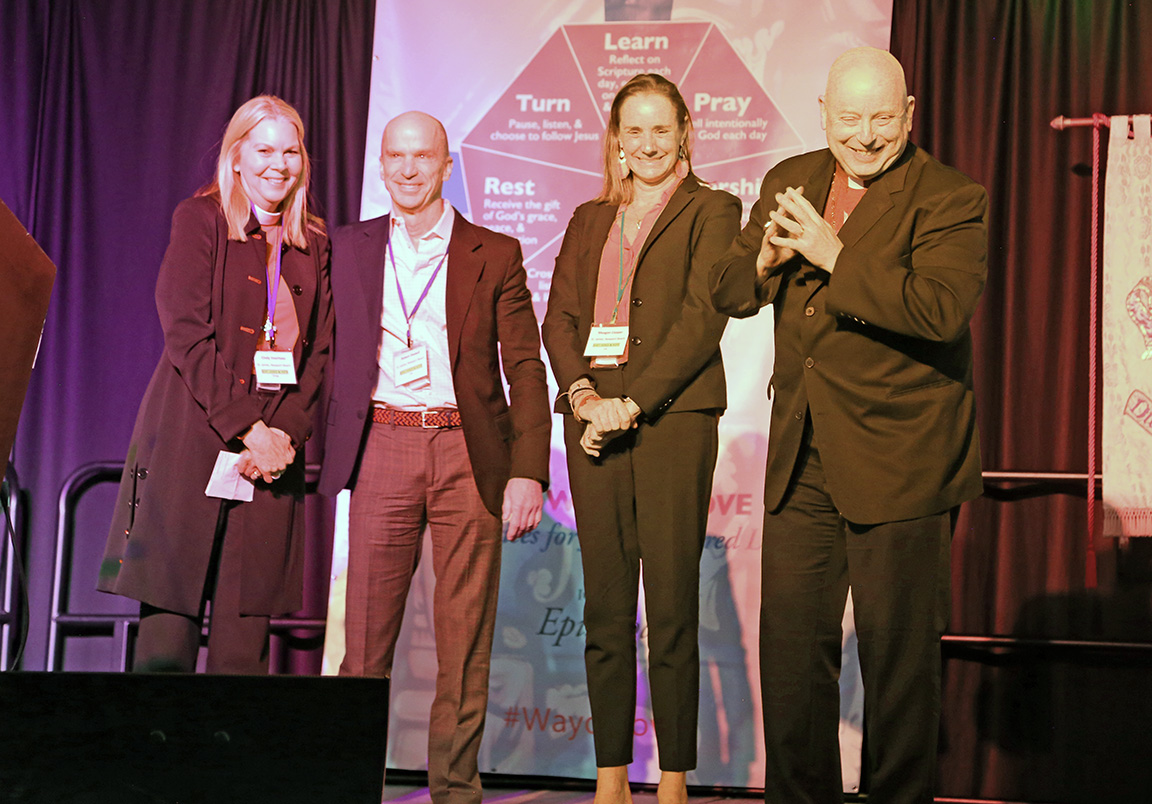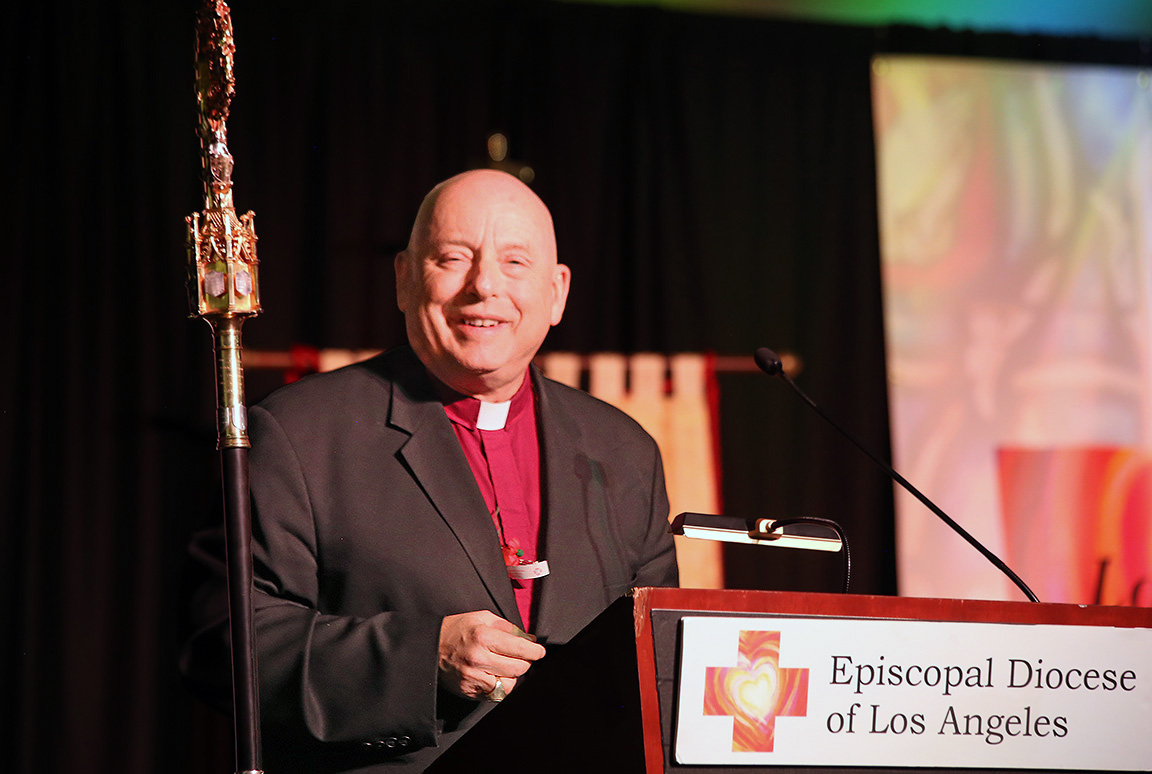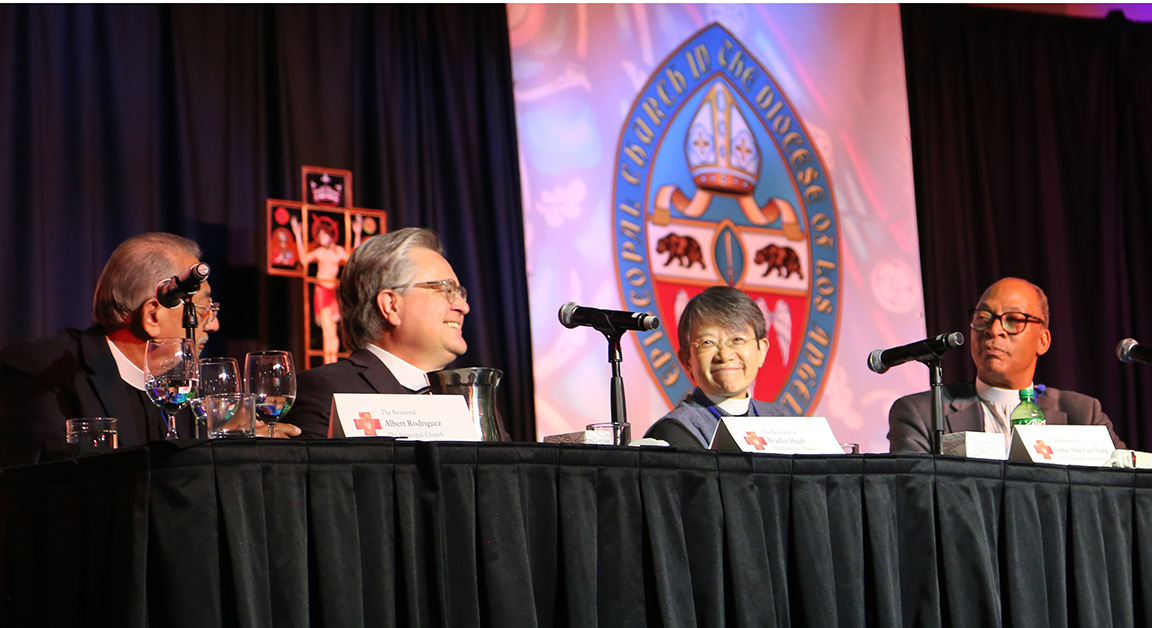
St. James’ Church, Newport Beach, leaders and Bishop John Harvey Taylor (right) celebrate as convention votes to move the mission congregation to parish status. From left: Former vicar, now rector Cindy Voorhees; Robert Shekell, former bishop’s warden; and Meg Cooper, present senior warden.
[The Episcopal News – Riverside, California] Bishop John Harvey Taylor on Nov. 10 declared that Episcopalians in the Diocese of Los Angeles “are woke and proud of it,” in an address to hundreds of lay and clergy delegates, guests, and visitors to the diocese’s 128th annual meeting, themed “Love in Action for Healing, Housing and Hope,” at the Riverside Convention Center.
“Sleepers awake – if we’re not asleep in darkness – if we’re awake in the light of Christ and striving to be mediators of Christ’s love, justice, and righteousness – then yes, that means we’re ‘woke’, said Taylor, reclaiming the social justice origins of the term, more recently used pejoratively by anti-progressive politicians.
“Being woke can take many forms – whether we’re woke to the condition of people different from us – or the danger posed by climate change to the Creation that people of all conditions share,” added Taylor, amid applause, cheers, and shouts of “yeah” by convention attendees.
Taylor’s address also incorporated reflections of his planned 2026 retirement, wars in Israel-Palestine, Ukraine, Maghreb, and Sudan; affordable housing; reconciliation; savoring relationships; supporting ministries for the LGBTQ+, multicultural and people of African descent communities; support for transgender rights, especially for children and young people; and reconciliation, specifically congratulating St. James’, Newport Beach’s admission as a parish congregation.
The meeting began with tributes to the late Canon Julie Dean Larson, vice chancellor, who died Sept. 11; acknowledgment to the Indigenous Peoples who occupied the area encompassed by the Los Angeles diocese; honoring veterans; and a tribute to the Episcopal Diocese of San Diego, formerly a part of the Los Angeles diocese which also was meeting in convention and celebrating its 50th anniversary,
Convention affirms St. James’ Church, Newport Beach, as a parish
Amid enthusiastic support, applause and a standing ovation, convention voted 329 to 20 to certify St. James’ Church, Newport Beach, as a self-sustaining parish, as recommended by Taylor.
The measure followed a 2018 vote that admitted St. James’ as a mission congregation in union with convention. St. James’ has continued to work closely with the diocesan Program Group on Mission Congregations and the Special Committee of Convention on the Incorporation of Parishes and the Admission of Missions, meeting canonical requirements toward parish status.
The Very Rev. Gary Hall, convenor of the program group on mission congregations, addressed convention in support of St. James’: “We are extremely pleased with the progress St. James’ has made over the past few years and enthusiastically endorse this application and look forward to continuing partnership with them.”
The Rev. Guy Leemhuis, president of the standing committee, also urged a yes vote. “On behalf of the Standing Committee, I also want to urge colleagues to vote yes at this momentous day that recognizes that reconciliation and love are in the house. This is truly who we are as a diocese. This is a day of celebration and remembrance that we continue to be dedicated to the walk of Jesus and dedicated to walking with each other, and sharing God’s love as we walk.”
The Rev. Juan Jimenez, rector of St. Michael’s Church in Anaheim, which is partnering with St. James on an affordable housing project, offered support for the Newport Beach congregation.

John Harvey Taylor delivers the bishop’s address at Diocesan Convention.
According to a letter of certification from the Rev. Canon Kelli Grace Kurtz, committee chair: “The members of this special committee and its advisors duly met to discern whether the application made by St. James Episcopal Church in Newport, CA (St. James), seeking admission into union with the Episcopal Diocese of Los Angeles as a parish is adequately, appropriately and completely submitted according to the Canons and Theology of Missions Handbook Requirements and Procedures.”
Following the vote, St. James’ rector, the Rev. Canon Cindy Evans Voorhees, visibly moved, thanked convention delegates, diocesan entities and staff, the Newport Beach congregation, and her husband for their support.
Robert Shekell, bishop’s warden from 2018 to 2021, thanked Taylor for instituting the diocesan-wide reconciliation “that allowed us to really heal. St. James’ focused on one mission, and that was to do good and to be worthy of being a mission in this diocese. I’m thrilled at what happened today.” He also thanked Voorhees “for unending integrity and a vision of leadership second to none. I’m not sure this would have happened today without her.”
Current St. James’ senior warden Meg Cooper recalled Taylor’s participation in the Orange County Pride Parade: “I was so proud to see this diocese there in support and allyship, embodying inclusivity, one of the values of St. James’ that resonates so deeply with me. My heart was literally bursting with pride and that’s what I feel right now.”
She thanked everyone involved in the decision. “To each and every one of you today, the love you have shown us in your vote and the words of support and encouragement … I could not think of a better example of love in action than what you’ve shown us today. On behalf of the entire St. James’ congregation, we love you too.”
Love in Action: Gospel Justice; LGBTQ+, Multicultural and African Descent Ministries
The Rev. Brian Tucker addressed convention about the ongoing work of the Bishop’s Commission on Gospel Justice and Community Care, founded in the wake of the May 25, 2020 murder of George Floyd by a Minneapolis police officer.
“The commission’s particular mission is to bring the church’s attention to places in our law enforcement and legal systems, particularly those involving race and mental health, which are not in alignment with the gospel message and to support activities to bring the gospel message to bear on them,” he said.
The group has focused on advocacy, including letter writing campaigns supporting passage of State Assembly Bill 988, also known as the Miles Hall Lifeline Suicide Prevention Act. The act was written after the death of Hall, a 23-year-old musician with mental health challenges who was killed by Walnut police. The law, which went into effect in 2020, establishes 988 as a national suicide prevention hotline.
Tucker said he has conducted Mental Health First Aid (MHFA) training in seven parishes. He is eager to bring this training to others and cited a need for additional instructors. MHFA is a 6-hour course that helps equip congregations and individuals with the tools to respond to possible mental health and substance abuse issues with compassion.
Convention attendees also viewed videos about diocesan ministries of the LGBTQ+ and people of African descent communities, which emphasized their work as examples of living love in action. The Black ministries video noted that an increase in funding from $1,800 per year in the previous decade to $34,000 in 2023 allowed the Program Group on Black Ministry to host multiple services honoring Black history and leaders and inviting the entire diocesan community to come and worship, learn and grow.

Panelists Al Rodriguez, Hispanic ministries consultant; Bradley Hauff, missioner for Indigenous Ministries; Fennie Chang, vicar of St. Thomas’ Church, Hacienda Heights; and Ron Byrd, missioner for African Descent Ministries, respond to questions from moderator Bishop John Taylor on multicultural ministries.
Multicultural and African Descent Ministries panel
Taylor moderated a panel discussion about the challenges and joys of multicultural and African descent ministries, featuring the Rev. Fennie Hsin-Fen Chang, vicar of St. Thomas’, Hacienda Heights and the Rev. Al Rodriguez, consultant for The Episcopal Church’s Hispanic/Latino Ministries; and two members of Presiding Bishop Michael Curry’s staff – the Rev. Bradley Hauff, missioner for Indigenous Ministries. and the Rev. Ron Byrd, missioner for African Descent Ministries for The Episcopal Church.
Echoing Taylor’s theme, Rodriguez said Latino ministry has entered a woke era. “There are close to 300 Latino congregations across the country.” The challenge for The Episcopal Church, he said, is to learn how to minister to the diversity of Latino experiences, including the native born who are bilingual or English dominant as well as the newly arrived and monolingual.
‘We do not know how to minister to the Latino who has been here for a long time, speaks no Spanish but is ethnically a true Latino in his own mind. Two-thirds of Latinos are native-born,” he said, so context and listening are very important.
Hauff, an enrolled member of the Ogala Sioux (Lakota) tribe of South Dakota, said that as far as his people are concerned, Jesus was Indigenous; that Native Americans knew of a Christ figure long before they heard of Jesus of Nazareth. “God was present with our ancestors as God is present with all people, with wisdom, teaching, ceremonies. We knew of a Christ figure in just about all our sacred traditions. We didn’t know about Jesus of Nazareth, the Palestinian Jew, but Christ was revealed to us. When early missionaries encountered my ancestors and began to teach them the gospel, we picked up on that right away. They didn’t bring us something we didn’t already have.” In at least one such tradition, he said, the Christ figure was female.
He pointed to Jesus’ time in the wilderness as equivalent to a vision quest, adding: “Looking at Jesus in that way benefits Indigenous and non-Indigenous people, opens new doors, emphasizes the universality of Christ. Christ is for all people, for the world. Christ cannot be confined to any one culture or language or … even religion.”
Chang said that about 80% of those with Chinese background coming to her congregation’s Hacienda Heights campus are newly arrived immigrants who had no previous religious experiences. Food provides a warm welcome, the chance to eat a meal together, and to connect, she said.
“One out of three Chinese language-speaking immigrants become Christian here” who were not Christian previously. “They need support, care, resources,” she said. “A lot are attracted to the church. Through the support of the church, they find identity, are cared for, become baptized and became Christians. They may be in your neighborhood.”
She invited convention attendees to attend a Dec. 7 event hosted by The Gathering, a Space for Asian American Spirituality, to be held at St. John’s Cathedral, aimed primarily for second and third generation Asian and Pacific Americans.
Byrd said Black Episcopal churches are in crisis, noting that the number of Black Episcopalians has dropped by nearly half since the pandemic. “Four years ago, there were a quarter million Black Episcopalians; now there are a little more than one hundred thousand,” he said. He called upon white congregations to engage with their Black counterparts.
Byrd shared, in response to a question, about a recent “bootcamp” initiative that brought together struggling Black congregations for leadership training, “to move from a place of surviving to sustainability and on to thriving.”
In other action, convention elected diocesan officers (see related story) and passed resolutions celebrating retiring clergy: the Rev. Eduardo Bresciani; the Rev. Randall Day; the Rev. Jane Gould, and the Rev. Betsy Hooper Rosebrook.
